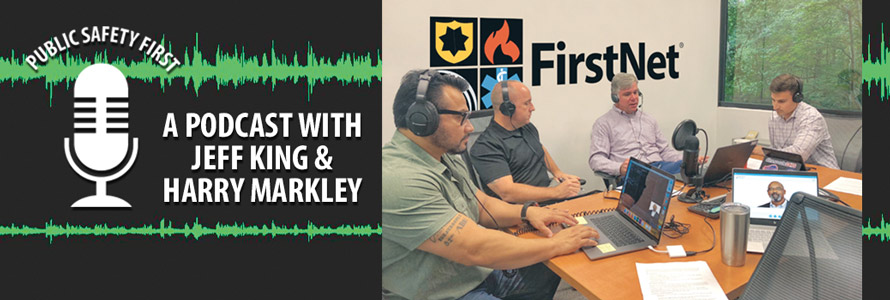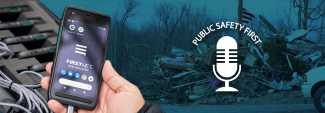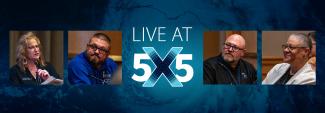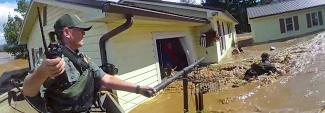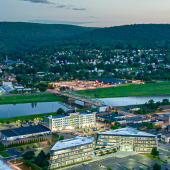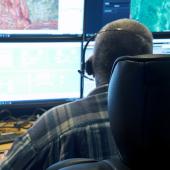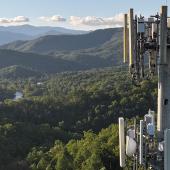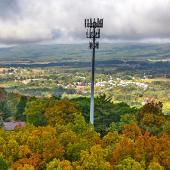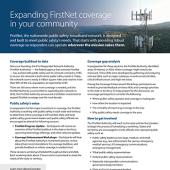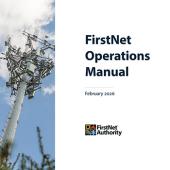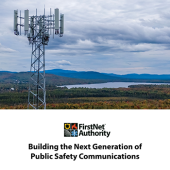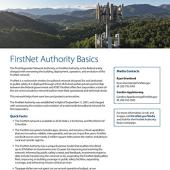Summary
In our latest episode of the Public Safety First, host Dave Buchanan chats with First Responder Network Authority’s Harry Markley, Senior Law Enforcement Official, and Jeff King, Senior Director of Field Operations on their law enforcement careers and the upcoming International Association of Chief of Police (IACP) 2018 conference.
Guest
Dave Buchanan
FirstNet Authority Executive Director of Public Safety Advocacy
Jeff King
FirstNet Authority Senior Director for Field Operations
Transcript
Preview
Narrator: You're listening to Public Safety First, a podcast to help you learn about the First Responder Network Authority and how you can be part of the future of Public Safety technology.
And now your host, Dave Buchanan
Narrator: You're listening to Public Safety First, a podcast to help you learn about the First Responder Network Authority and how you can be part of the future of Public Safety technology.
And now your host, Dave Buchanan
Dave Buchanan: Welcome to the Public Safety First podcast. Today's podcast, we’re going to be talking about law enforcement. The law enforcement community in the upcoming conference is [one] that we're going to be attending in Orlando with police chiefs and law enforcement executives around the country. I'm joined today by two of my colleagues, Harry Markley and Jeff King and they're going to share their experiences and their careers in law enforcement, and talk to us a little bit about our upcoming role at the Major City Chiefs Conference, the International Association of Chiefs of Police Conference, and The Police Executive Research Forum. All of which convened themselves back to back to back in Orlando in October. The law enforcement community has been incredibly supportive, [they’ve] been champions of FirstNet since long before there was a FirstNet and we've made a concerted effort throughout our engagement and consultation program to ensure that we are capturing the needs of law enforcement, that we're engaging law enforcement executives who are engaging law enforcement professionals at all levels of their career to really make sure that this network drives at Public Safety's, not only Public Safety's needs, but law enforcement specifically needs their unique needs for the network the unique aspects that they're looking for in order to optimize their law enforcement operations and that's really the extent and the purpose for us engaging at these conferences, as well. So we're going to have a chance to talk about that and really reflect upon the priorities that law enforcement is looking for in the FirstNet network. So I want to start by introducing Harry Markley. Harry joined us earlier this year. He retired from the Phoenix Police Department and he's joined us as a Senior Advisor for Law Enforcement where he is our point of contact on all things law enforcement. He eats, sleeps, drinks, and lives for law enforcement and our relationship with the law enforcement community here at FirstNet. Harry, can you tell us a little bit about your background and how you got to FirstNet and what it was like before you joined us earlier this year?
Harry Markley: Well, I joined FirstNet in February of this year and prior to that I was with the Phoenix Police Department for just over 31 years. [I] started as a young control officer like all police officers do - worked every precinct in the city, and had several different assignments, did everything from working as an undercover narcotics detective, to commander, to SWAT team, worked in and commanded several different precincts, even ran the state crime lab and the State Police Academy. And my last job I had before I let the police department was, I was the chief of the patrol division. And in Phoenix that's the division, the largest division in the City of Phoenix – makes up about 60% of the police departments and we cover every precinct in the city, every square mile of the city including the downtown, and all the special sports and sports events so it was a very busy hands-on job. And I can tell you when I left that job, it was, it was a lot of work. It was year after year after year of 65-70 hour weeks and when I left, as much as I loved the job, I told myself I never and can I go back to work again, but FirstNet changed my mind. I had a colleague that was involved with the program, he told me about it and it engaged me, intrigued me, and I really think that there's a tremendous value in this program that's what got me to come back to work. It's very important to Public Safety, and I truly believe it’s going to make officers and citizens safer.
Dave Buchanan: Thanks Harry, and we feel very fortunate we were able to recruit you for this job and your background obviously makes you well-suited for the work that we're doing and I think your background is a real, as we go and do engagements across the country, really makes us a differentiator and part of our differentiated service at FirstNet is the fact that we have subject matter experts and folks like yourself with such extensive public safety backgrounds and have done that job for more than three decades, so I appreciate you, and I appreciate you joining the team. Can you tell us a little bit about what the work has been like for you? What are these engagements we've been doing? What have you been exposed to, and what's been interesting to you about that work?
Harry Markley: Well, you know it's interesting because I've always dealt with police officers, as either as a peer, as a supervisor, or manager and so now never as an outside – for lack of a better word – we'll say consultant so, it's very different but it's very similar. It was a great transition to retirement for me. I will tell you that I have been, and seen, and talked to everybody in the last six to seven to eight months and when we talk about law enforcement I always tell people, “We are very unique, we are like unicorns, we’re like nobody else,” and I think that's the value of my position is that I speak the language, I understand the relationships, and we just don't, we don't think like anybody else. I’ll give you an example, you know police officers have a set of rules that they have to live by, it's, we call them operations orders, and it's about 8,000 pages of what not to do. When I first came on, they told us what kind of shoes we had to wear – They had to be low quarter military-style shoes, with a quarter-inch sole, with six to eight eyelets capable of being spit-shine. Now, I can still remember that after 31 years. So, you take a person that has that type of mentality, and then you tell them, “hey I really want to show you something that's going to make your life easier”. It's a very hard audience to break into, but I will tell you that once you get law enforcement engaged, and they believe in a program, or the benefit that you're trying to provide them, they're a tremendous partner.
Dave Buchanan: Harry, can you talk a little bit about what do you see is the leading attribute of FirstNet that law enforcement is most looking forward to? What is the aspects that when they hear about it, you see the excitement, and you see them most excited about?
Harry Markley: Well I can tell you I think that there's a couple of things (1) the ability to communicate with others seamlessly, to not have to compete with anybody else when it comes to data and (2) the ability to get on the airwaves. That's huge. As a police manager and executive that managed several large-scale events including Super Bowls, and Final Fours, and presidential visits. 90 percent of the work I did was on a telephone, it wasn't on the radio. So, I can tell you for law enforcement, it's that, that ability to communicate above all else is huge, and that's one of the great values of FirstNet and then the other value, we don't know yet because it's still in its infancy. I think if we go backwards, you know how long the iPhone has been around, we were so impressed with the iPhone because we could expand and contract the picture. And then, fast forward ten or twelve or fifteen years, and now they have a whole network of a thousand apps and so, and that's, and that's where FirstNet is right now. I mean, it's got some amazing opportunities for us now with the apps that we have and the ability to communicate, but man, what's really exciting is what the future is going to hold for us when it comes to FirstNet and the things that it's going to be able to do and the different technologies it’s going to be able to connect us to. And I think that for police managers around the country, it's going to make their jobs easier. And, “Easy,” is not a word I thought with ease when it comes to police work, cause it's a difficult job, but anything that could make our job more efficient, safer, and to allow us to at least impart information to each other in times of crisis, is a lifesaver.
Dave Buchanan: Now I'm going to turn to Jeff King. Jeff King is our Senior Director for the Field Operations Team. He's responsible for more than 30 employees and five time zones all across the country, who are responsible for engaging Public Safety at all levels. Jeff, can you tell us a little bit about how you got to FirstNet? Give us little bit of background on your career.
Jeff King: My career actually started in the military. I was a communicator in the US Navy for 10 years. After completing service with the White House, I moved on to private industry for a while where I worked in private firms and publicly-traded firms, inserting technology into mission-critical environments around the world. I then moved on to Federal service where I worked the SAFECOM program, so I've been in this conversation of emergency communications for some years now. I worked the, across the country consulting with Police, Fire, EMS, on their emergency communication issues and then I had an opportunity to come to FirstNet, and I say an, “opportunity,” because it is truly a unique never-before-done effort whereby we get the opportunity to get the platform for advanced technologies to the men and women of our emergency response core across the country.
Dave Buchanan: So you've obviously, as you said, you've seen the benefit and the need for emerging technologies in communications, in emergency communications, in public safety communications. And you've now worked – you and I've worked together for more than three years engaging directly with Public Safety on this specific need around dedicated broadband for Public Safety. What have you seen, Jeff, from the law enforcement perspective, back to the similar question I just asked Harry about, what's the key ingredient here for law enforcement as they look ahead to adopting FirstNet as their provider for wireless broadband?
Jeff King: As a part of that career path, I also spent time with the Metropolitan Police Department so I've got a little firsthand knowledge here on the street level, whereby three things come to mind for me: efficiency, safety, and situational awareness. I think that if you look at what FirstNet brings, we have options for voice, video, and data, and they come from many different sources – be they body-worn cameras, street cameras, any data source out there. It gives us the ability to leverage voice, video, and data, in our operational scenarios and do the jobs more efficiently, and more importantly, more safely.
Dave Buchanan: Thanks Jeff, and thanks Harry for your perspectives on the value of FirstNet for law enforcement. Harry, I want to move back to you and talk more specifically about the work we're about to do in Orlando. As I mentioned, we're going to be involved with the Major City Chiefs meeting, we're going to be involved with the International Association of Chiefs of Police meeting, and the Police Executive Research Forums Town Hall meeting. You know, between these three events, it's literally thousands of law enforcement executives and officers. Harry, tell us a little bit of what the FirstNet footprint is going to look like for those that are going to the conference, and what can they expect from us when they're in Orlando?
Harry Markley: I can tell you that this is, we're going to have a lot of boots on the ground for this conference. It is the largest law enforcement conference of the year and it's so great because we have a lot of people in the same place, at the same time, so that we have a really great opportunity to make a large impact with the large number of people. This year for IACP, we're going to have several different panels that are going to be going on. We're going to have one on mobile data and services and devices for real-time situational awareness for officers. That panel is going to have several amazing people on it, including some police chiefs, some high-ranking officers from different police departments around the country. We’re going to have another panel that talks about apps and technology solutions that you need, and then we're also going to be presenting in front of several different committees during the conference.
Dave Buchanan: One of the committees were going to be involved in at IACP is the Communications and Technology Committee. Last month at APCO, I had a chance to sit down with Eddie Reyes who's the chair of that Committee.
Eddie Reyes: You know, I was fortunate to be granted the chair position of the Communications and Technology Committee of the IACP after Harlan retired after being the chair of that committee for over 35 years. So, I knew I was filling in some very, very big shoes and I think one of the values that they saw in me, you know, bringing me on as a chair was a collaboration piece. I mean, I'm a huge collaborator and one of the things that I love doing is bringing both the vendor community and the practitioners to the table, and The vendor community, hearing firsthand the needs of the practitioner community, and then the practitioner community hearing from the vendor community what's being developed and what's possible and what's not possible; I think that blending of those two groups really has been very successful for this committee. But, you know I always focused on having FirstNet as part of our briefing. We have two meetings a year and having a briefing from FirstNet was always very important to me, and I really look forward to having that continue because I know that my committee members, as well as the chiefs that we advise around the world are constantly asking about, “What's the latest with FirstNet?” and so we know from a committee perspective that that's a very important piece that we have to communicate out to our membership. So, I could not be happier with the collaboration that we've established with FirstNet and I very much look forward to long-lasting presentations at our meetings, and an ongoing dialogue with FirstNet.
Dave Buchanan: One of the topics that we know is going to be prevalent, and we've seen this emerge more and more at these conferences, is the issue of Internet of Life-Saving Things, and we've talked a little bit about that here inside FirstNet. Harry, what does that mean to you, and what do you think that means to your typical cop on the street as they’re looking ahead to FirstNet?
Harry Markley: Wow, well I can tell you that means a whole lot of different things. I think that is the future of technology and how we can make or use FirstNet to tie all sorts of things together from-from body-worn cameras, to life-saving sensors on vests, to sensors that lets you know when an officer pulls his, pulls his weapon, to the ability to use drones to send information back to the ELC, the ability to, to take information from neighborhoods like video cameras or surveillance systems and pike those back to the police department so they can use those to do their job more efficiently and safely – And that's just the law enforcement side, there's a whole other side when it comes to fire services, and to EMS services, and how they can use the Internet of Life-Saving Things to save lives and protect the public.
Dave Buchanan: Jeff, you've obviously seen a lot of technology, technological change in emergency communications over the last thirty years in your career. Where do you envision public safety communications going in the next decade? And, what would law enforcement officers, what would they look forward to as we think about the future of public safety communications?
Jeff King: That's a great question. I have watched this evolution both from afar, and from some time on the ground, and I would say that typically, public safety entities are a little slower to adopt some of the bleeding edge technology, but once proven, those technologies are then quickly adopted, particularly when they equate to safety or efficiency gains. So, what I believe is going to happen is, we're going to see a –an uptick in adoption of services whereby video, and again data, and voice are used in this digital media, in digital media to the betterment of the operational core. So from a leadership perspective, what does that mean? So I believe, and I’d like to hear Harry's perspective as well, but from a leadership perspective that means, if my officers are doing their jobs more efficiently, and those reports are processed, say on the street instead of in –you have to drive all the way back to your station, then then they're on the street more and as a leader in law enforcement, I'd be interested in talking about those efficiencies and keeping police officers on the street, and keeping those neighborhoods safe. And from a user's perspective, in my opinion, I think we're going to see, again, more efficient and more safe operations. They'll be able to take advantage of the video that is there [that] we've never been able to harness and bring into a car – say, so that, that, that police officer will know when they go into a neighborhood. They'll have sometimes the ability to grab some of this video and know situationally what they're going into, which is a huge safety factor when we talk about awareness. So, I think there will be leaps in capability on each of those platforms: voice, video, and data, again to the betterment of the operational core.
Dave Buchanan: Harry, what are your thoughts about the future of public safety communications? You want to follow up on Jeff's comments?
Harry Markley: Yeah, I would love, to add some stuff to that. I will tell you that I think as far as technology is concerned, law enforcement is in its infancy when it comes to the use of technology, but I think that with the development and the deployment of FirstNet, we're going to rocket ahead. There's lots of offerings out there, but not all of them are of value, and I really feel that law enforcement needs to avoid technology for technology's sake and we need to take advantage of technology that will make our jobs easier safer and more efficient. Some technology actually makes our jobs more difficult – that, slows down our production, and I'll give you a perfect example. When I was a young police officer, thirty-one years ago, I could take someone into custody, arrest them, fill out my booking paperwork in my car, take that person to jail, and be back on the street in about an hour-hour and a half. You rocket forward 31 years, we have all this new technology, and now that same process takes about six hours. That's not technology making our life easier. We need to make sure that whatever technology we find out there, that it has a value to police officers. There’re always three things I look for when it comes to technology, or anything when it comes to law enforcement, and that is, “What they’re asking me to consider, does it work?” and FirstNet works. The next thing is, “Do I need it?” and I know that we need better communication, I know that we need the ability to use technology to make our jobs safer. And the last one is, “How much does it cost? And cost just not, is not just how many dollars it's going to cost me, but what does it cost me if I don't do this?” and the answer is simple: it's going to cost us safety, it's going to cost us efficiency, and it could cost us, it could cost us officers’ and citizens’ lives because we’ve always had the ability to communicate, not just when things are good, but when the unexpected happens. And I think that that is a value of FirstNet - is that we will always be able to have that line open, that we'll always be able to communicate, that we'll always be able to get our message across, and communicate with the people in the field that are doing the work.
Dave Buchanan: Thanks Harry, and I think a lot of law enforcement officials are going to be asking themselves those same questions in Orlando, and I'm delighted that you'll be there, and Jeff will be there, and our whole team will be involved with the IACP conference, engaging with the major city chiefs, and participating in the PERF Town Hall. It's a great opportunity for us to connect with those professionals who serve the public through law enforcement, and I think you both are well-suited to help answer those questions and have those conversations, so I really appreciate the work you're going to do when you get to Orlando. Jeff, you've been to a number of IACP conferences and other Law Enforcement Professional Association meetings, what are you looking forward to the most as you look ahead to the meeting?
Jeff King: Two things, first of all, to have the opportunity to engage this country's leadership in such a venue is a wonderful opportunity first and foremost, and I think this entire program was built on this. I get the opportunity to go listen and learn, so these venues offer information-sharing, best practice-sharing, and things like that, but also talking about other current trends and what's going on in the law enforcement community. We get an opportunity to listen to that, and to help articulate what the value is of FirstNet in those respective environments and, you know for me, you know, Harry hits on a great point: adopting technology for technology's sake is not the answer. Adopting technology to make a difference, in a positive leap, and capability for your officers is important, so for us to be able to have the conversation with leadership across this country is a tremendous opportunity and we look forward to being there to do that.
Dave Buchanan: Harry, I know you've been to IACP conferences in the past, this will be your first IACP as a member of the FirstNet team. What are you looking forward to, and what are you most excited about when you think about the meeting coming up in Orlando?
Harry Markley: Well, you know, a couple of things. Like I said, I retired in February and so this is going to be a great opportunity for me to reconnect with some old friends and make new acquaintances and also, to help spread the message and the word about FirstNet. I know that most police agencies know about it already, but that's not enough. We want to make sure that we can express the value of this program and why they need it. You know, like I said cops are very unique individuals, and you know we're not trying to sell them a program, we're trying to show the value of this program, and make them partners with us. Also, just to gather from them, what they want from the program so that the program provides what it is that they need. So yeah, all those things, and it's also a great opportunity to network, to learn new things myself, because I'm constantly trying to learn and trying to grow, and I think that only makes me a better police officer, a better person, and also a better resource when it comes to FirstNet.
Dave Buchanan: Harry, I liked what you said earlier about when you reflected on this last year and your retirement, and the opportunities you had to choose – you have different choices for your life, what made you want to come to FirstNet? What makes you want to continue to serve law enforcement this way?
Harry Markley: Well, I can tell you when I left the job, like I said before, I had no intention of working again, but I will tell you that I missed it. I missed the people, I missed the service. You know, I’ve had a lot of jobs in my career and everyone always asked me, “What was the best job you ever had as a police officer?” and I had a lot of jobs. I mean SWAT was great, and training was great, but the best job I ever had was being a 24-year-old patrol officer in a car answering calls for service and doing something and seeing something different every day and that's what I get to do with FirstNet. I get to see different people and put myself in situations I’ve never been put in before, because I will be honest with you, when I was the police officer I was not the technology guy. So, this is this is new ground for me, but I learn more and more every day and it is, it is exciting for me to come to work today to advocate for a program that I really believe is vitally important to law enforcement.
Dave Buchanan: Thanks Harry, I appreciate your comments today. Jeff, your career, similarly, you've been inside government, you've been outside government, you've been in the private sector, you’ve been in the public sector, you’ve been in law enforcement – What made you want to come to FirstNet?
Jeff King: Again, a very good question, and for me it's the people. It comes back to the people that do the mission. So I've been fortunate enough in my career to wear two uniforms. I've never been more comfortable than I've been in those two uniforms, and with the people that I was serving with. So that fraternal peace is a huge piece for me, and helping them navigate this evolution and technology, and their respective workspaces is very important to me. In this stage of my career, I’ve got some insight, I don't have all the answers, but I've got some insight. I'd like to share that, and then help them along as they, as they traverse this learning curve of “where do we smartly insert new technologies into our business practices”?” As Harry alluded earlier, just adopting technology for the sake of adopting, is not the answer. To do it where it approves efficiencies and safety mechanisms, that's the key, and to be able to have that conversation with the men and women of law enforcement is why I'm here.
Dave Buchanan: Thanks Jeff, and thanks again Harry. I appreciate you guys joining me on the Public Safety First Podcast. I appreciate your time, and I want to thank you in advance for the work you're going to do in Orlando at the law enforcement conferences. Thank you.
Narrator: Thanks for listening today. We're excited to have you join our podcast community. Make sure to subscribe on iTunes, SoundCloud, and YouTube. You can learn more about the First Responder Network Authority at FirstNet.gov and learn about FirstNet products and services at FirstNet.com.


